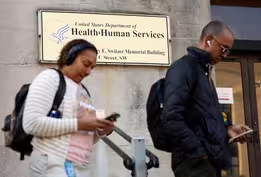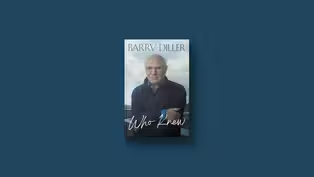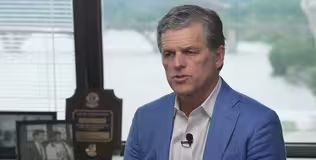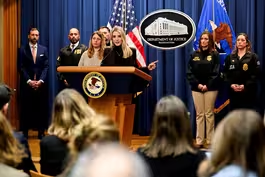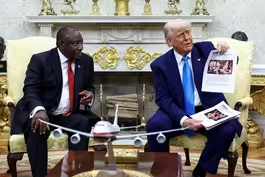
Minneapolis reflects on changes 5 years after George Floyd
Clip: 5/21/2025 | 9m 10sVideo has Closed Captions
Minneapolis reflects on changes 5 years after George Floyd's murder
The Trump administration is walking away from police settlements in two major cities and closing investigations in six others. It comes days before the fifth anniversary of George Floyd’s murder. His killing sparked intense protests with calls for racial justice and police reform. Special correspondent Fred de Sam Lazaro reports on what’s changed, and what hasn’t, for our coverage of Race Matters.
Problems playing video? | Closed Captioning Feedback
Problems playing video? | Closed Captioning Feedback
Major corporate funding for the PBS News Hour is provided by BDO, BNSF, Consumer Cellular, American Cruise Lines, and Raymond James. Funding for the PBS NewsHour Weekend is provided by...

Minneapolis reflects on changes 5 years after George Floyd
Clip: 5/21/2025 | 9m 10sVideo has Closed Captions
The Trump administration is walking away from police settlements in two major cities and closing investigations in six others. It comes days before the fifth anniversary of George Floyd’s murder. His killing sparked intense protests with calls for racial justice and police reform. Special correspondent Fred de Sam Lazaro reports on what’s changed, and what hasn’t, for our coverage of Race Matters.
Problems playing video? | Closed Captioning Feedback
How to Watch PBS News Hour
PBS News Hour is available to stream on pbs.org and the free PBS App, available on iPhone, Apple TV, Android TV, Android smartphones, Amazon Fire TV, Amazon Fire Tablet, Roku, Samsung Smart TV, and Vizio.
Providing Support for PBS.org
Learn Moreabout PBS online sponsorshipGEOFF BENNETT: As we just heard, the Trump administration is walking away from police reform settlements in two major cities just days before the anniversary of George Floyd's murder.
It's also closing investigations in six other places, including Phoenix, Memphis, and Oklahoma City.
It was the death of George Floyd five years ago that sparked intense protests, with calls for racial justice and police reform around the country.
Special correspondent Fred de Sam Lazaro reports on what's changed and what hasn't for our ongoing series Race Matters.
FRED DE SAM LAZARO: On a sunny Saturday in Minneapolis, community members tend to the intersection where George Floyd drew his last breath.
WOMAN: Every time I pick up my brush.
FRED DE SAM LAZARO: They apply fresh paint to the faded list of names of people killed by police.
For half-a-decade now, George Floyd Square has sat as a memorial, mostly untouched, flowers, stuffed animals, and art surrounding the spot where Floyd died, the abandoned gas station across the street, the raised fist sculpture at 38th Street and Chicago Avenue.
Five years on, the future of this intersection remains unsettled.
A key question is whether automobiles should still be allowed through it.
It's a matter of balancing the needs and especially the security of residents, of businesses, and of the visitors coming to the memorial.
JEANELLE AUSTIN, Rise and Remember: We can't make the street infrastructure the highest priority and the determination of wellness and the determination of healing.
EDWIN REED, Sincere Detailing Pros: They have ruined all these businesses here with all this barricade and this blockage and all this stuff that they are putting up in the street.
FRED DE SAM LAZARO: Opinions about this square, much like the opinions about Minneapolis' progress since 2020, are mixed.
At first, there were pledges to defund the police, billions of dollars for racial justice work, including from Minneapolis-based Target, convictions of the officers involved in Floyd's death, state and federal consent degrees to reform the Minneapolis Police Department.
But since then, the winds have shifted.
Crime spiked in Minneapolis.
More than a third of the city's officers left the force.
Storefronts remain empty.
Property values have dropped.
Businesses, including Target, ended their DEI efforts, and today's announcement that the Justice Department is moving to end its consent decree with Minneapolis is only the latest in several moves across the country.
Florida passed a law restricting police civilian review boards.
Louisiana made it harder to sue officers.
Cities like Portland and Los Angeles restored police funding that was cut after Floyd was killed.
And Washington, D.C., increased punishment for a range of crimes.
ANGELA HARRELSON, George Floyd's Aunt: What happened in 2020 after my nephew was killed, it rocked the country.
It shook the system, but it didn't break the system.
What we need is the system to be broken.
FRED DE SAM LAZARO: George Floyd's aunt, Angela Harrelson, co-chairs Rise and Remember, the nonprofit dedicated to Floyd's memory.
ANGELA HARRELSON: I don't allow anyone to tell me that we're not going forward.
When this happened 2020, it hit at a raw core of the human beings' hearts.
Do you really think that's going to change after five years?
No.
FRED DE SAM LAZARO: Harrelson says the institutions now pulling back from reform efforts were never truly committed.
ANGELA HARRELSON: Corporations, all types of people, in the beginning, they jumped on board and became part of the movement, but they did not become the movement.
The most important thing is, when the cameras stop, who's there?
FRED DE SAM LAZARO: Minneapolis has seen some public safety reforms.
Its court-enforced agreement with the state put limits on traffic stops, use of force and emphasized de-escalation.
The city has tried to expand non-police services, though with mixed results.
Unarmed responders are now sent to about a 10th of 911 calls.
Also, police use of force incidents declined from 4,300 in 2021 to less than 2,400 last year.
How would you assess where the city is today five years later, broadly speaking, the city of Minneapolis?
TODDRICK BARNETTE, Minneapolis, Minnesota, Community Safety Commissioner: We're in a better place than we were in 2020.
FRED DE SAM LAZARO: Todd Barnette was named Minneapolis community safety commissioner in 2023.
He says the MPD, while still short-staffed, has seen a gradual rebound in hiring.
And he says the city will move forward with its reforms, no matter what the Trump administration does.
But when asked about the many residents across the city who are unsatisfied: TODDRICK BARNETTE: Then we're not doing a good job showing them all the positive things that we're doing, not just for the police department, but change for the city.
I hear them and love to sit down and talk about why they think that, because there's a lot of change happening, and it's good.
MEDARIA ARRADONDO, Former Minneapolis, Minnesota, Police Chief: You know, I used to work out of this building.
FRED DE SAM LAZARO: Medaria Arradondo, a Minneapolis native and 30-year veteran of the MPD, was chief in 2020.
He says there's been incremental progress over the past five years.
His new book, "Chief Rondo: Securing Justice for the Murder of George Floyd," offers his account of what transpired in the days, weeks and months after the killing, including the burning of the Third Precinct.
MEDARIA ARRADONDO: With the crowd in the thousands, hearing, intermittent gunfire, Target has been looted, my number one focus at that point was no more funerals.
FRED DE SAM LAZARO: To some, Floyd's killing stemmed from a toxic culture that persisted within the MPD.
Others pointed to a failure of leadership.
Do you feel personally responsible for anything that led up to that event?
MEDARIA ARRADONDO: I don't feel personally responsible for what former Officer Derek Chauvin did to Mr. Floyd.
At the end of the day, you're leading people.
And you're leading people who come from an imperfect society.
And you have to do all you can to hopefully vet to make sure that the people who are wearing that badge at the end of the day have good character.
If you would have told me that anyone wearing that uniform would have been capable of what occurred that evening on May 25, 2020, I would have told you, no way.
FRED DE SAM LAZARO: Arradondo says he's also surprised at the growing questions around the circumstances of George Floyd's death.
Many in right-wing circles now cast doubt about the cause of death, pointing to his drug use, even though testimony at Derek Chauvin's trial ruled out an overdose.
They have criticized the cases against the officers involved, and some have even called on President Trump to pardon Chauvin.
MEDARIA ARRADONDO: To create this other universe of opinion, I think it's very damaging, and I think it's dangerous.
FRED DE SAM LAZARO: Chris Madel is a lawyer in Minneapolis who's represented police officers.
He doesn't support a pardon for Derek Chauvin, but says: CHRIS MADEL, Attorney: You cannot have a fair trial when you are having the venue of that trial in the exact same location where there was rioting, where there was looting.
FRED DE SAM LAZARO: Madel says that changes in Minneapolis over the past five years have been -- quote -- "dramatic."
And he argues the city's reforms make it harder for law enforcement to do their job.
CHRIS MADEL: When you really need a police officer in order to intervene and help you, the last thing I want them thinking about is some suit sitting high up in an ivory tower second-guessing their decisions.
FRED DE SAM LAZARO: Madel represented a State Trooper who was charged with murder after fatally shooting a Black driver in 2023.
The charges were dismissed when the county attorney concluded she could not prove the use of force was unauthorized.
Her dismissal announcement said -- quote -- "While we can hope that it will never happen again, until we address the reasons that Black men end up shot by police, it will."
CHRIS MADEL: A lot of that narrative around race is not meant to cure.
It's meant to divide.
It's meant to get votes.
It's meant to get clicks.
It's not meant to actually solve any problems.
FRED DE SAM LAZARO: Back at George Floyd Square, Angela Harrelson can't help but think about her nephew these days.
ANGELA HARRELSON: You can't put a start date on grief or mourning and you can't put an expiration date on it.
FRED DE SAM LAZARO: Harrelson remains optimistic that meaningful change is possible in the city where her nephew lost his life.
For the "PBS News Hour," I'm Fred de Sam Lazaro in Minneapolis.
GEOFF BENNETT: Fred's reporting is a partnership with the Under-Told Stories Project at the University of St. Thomas in Minnesota.
The background of surgeon general nominee Casey Means
Video has Closed Captions
Clip: 5/21/2025 | 6m 29s | The background and career of Casey Means, Trump's pick for surgeon general (6m 29s)
Barry Diller shares personal story in new memoir 'Who Knew'
Video has Closed Captions
Clip: 5/21/2025 | 6m 25s | Barry Diller shares personal story and chronicles remarkable career in 'Who Knew' (6m 25s)
Former educator works to restore dignity to disagreements
Video has Closed Captions
Clip: 5/21/2025 | 8m 3s | Activist and former educator works to restore dignity to political disagreements (8m 3s)
How the DOJ under Trump is targeting political adversaries
Video has Closed Captions
Clip: 5/21/2025 | 7m 33s | How the DOJ under Trump is targeting his perceived political adversaries (7m 33s)
Trump confronts South African president with baseless claims
Video has Closed Captions
Clip: 5/21/2025 | 7m 34s | Trump confronts South African president in tense Oval Office meeting (7m 34s)
Providing Support for PBS.org
Learn Moreabout PBS online sponsorship
- News and Public Affairs

FRONTLINE is investigative journalism that questions, explains and changes our world.

- News and Public Affairs

BREAKING the DEADLOCK sparks bold, civil debate on America’s toughest issues.
Urban Consulate Presents











Support for PBS provided by:
Major corporate funding for the PBS News Hour is provided by BDO, BNSF, Consumer Cellular, American Cruise Lines, and Raymond James. Funding for the PBS NewsHour Weekend is provided by...
